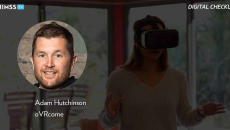Emerging Technologies
A Singaporean startup leverages Asian-specific databases in making heart disease risk assessments.
The integration gives providers access to patient data from 350 wearable devices.
At CES in Las Vegas, Circular announced its next-generation health-tracking ring with ECG capabilities, and VIV Health unveiled its ring with generative sleep-aid sound technology.
Some leaders say AI will improve a massively inefficient, overpriced and difficult-to-access healthcare system, while others anticipate AI’s potential for earlier, more accurate diagnosis.
PHI is one of the most sensitive classes of data out there. It's important that the right security controls are in place to make sure those things stay where they need to be and don't get into the wrong hands, says Chike Okeke of Concord Technologies.
Adam Hutchinson, oVRcome founder and CEO, discusses reducing phobias using VR exposure therapy, how the company fills the gap in VR psychiatric care access for providers and patients, and its trial on combatting social anxiety with VR.
Steen Strand, CEO of Emteq Labs, discusses the company's launch of Sense, emotion-sensing eyewear that collects real-world data on a wearer's facial expressions and its potential use for healthcare data collection.
Peter Bonis, chief medical officer of Wolters Kluwer Health, discusses health provider and consumer skepticism around AI, supporting trust in AI, the adoption cycle of the technology, and the importance of understanding its limitations.
Torrey Smith, cofounder and CEO of Endiatx, discusses the company's pill-sized robot, Pillbot, that swims inside a patient's stomach to allow for virtual gastroenterology examinations and how it sees the tech being used in the future.
Zipline cofounder and CTO Keenan Wyrobek discusses how using long-range drones for prescription delivery and lab services as well as health-at-home programs support could reduce care costs and delays and improve patient experiences.







